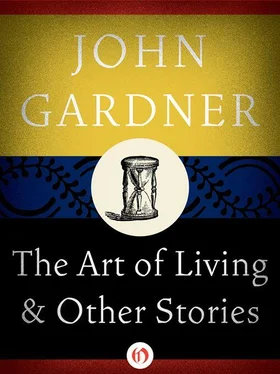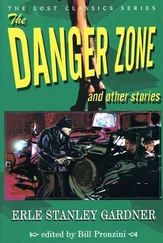We went on staring at the table, maybe all of us thinking about that slip, “dead right.”
Arnold said, talking more quietly all at once, “Art, ya see, art stirs up emotion that people can get together on. Universal humanness, you know what I mean? It’s one of those centers of order I was talking about. It doesn’t matter whether you’re the artist or one of the serious appreciators, one of those people that gets a big crowd together and goes to listen to, ha ha, Ol’ Blue Eyes every time he comes to town. Life’s full of drift. Everything. Drift.” His voice was shaky. We all breathed shallowly, as if to steady the room, keep him from breaking out in sobs. I was thinking dark thoughts — I suspect we all were. I was sorry for him, sure, and I knew you couldn’t blame him; but I wished he’d get the hell ahold of himself. No doubt that was programmed too, I thought — the inclination to pull away, leaving the dying to the wolves.
“Listen,” I said, “nobody’s down on art, okay? Artists are beautiful.”
Angelina was staring into the mirror, no doubt thinking, correctly, that she was art. Accidentally, our eyes met.
The cook was wringing his hands, moving his shoulders back and forth as if his back ached. Instead of taking the out I’d offered him, he felt, apparently, a compulsion to be honest and exact. “It may not be they all are,” he said, sort of whining. “I guess there are some that cut their ears off and shoot themselves, maybe even a few that shoot other people.” He jerked his mouth, then leaned forward, quickly and guiltily licking his lips. His cheeks were wet, tears oozing out in a thin wash below the steel-rimmed glasses. I agreed with Benny the Butcher, shaking his head. There wasn’t much hope. Maybe the floor would open up and the cook would vanish.
He brushed at the wetness on his cheeks with both hands, then bent his head and rolled his eyes up, still guilty but also cross now, damned annoyed at our daring to pull away on him. Maybe he sensed that his talking of himself as an artist was beginning to grate. His tone became stubborn, petulant. “But it’s not as artists they do those things,” he said, “or anyway the crazy things aren’t what makes ’em artists, though maybe it all goes together, maybe artists are children, impractical and so on.” He stretched his chin out, warning us not to agree with him too boldly. “But you gotta consider the end result,” he said. He poked the table, hard, with his finger. “If he’s an artist, what a man does, or a woman, is make things — objects which nobody asked him to make or even wanted him to make, in fact maybe they wanted him not to. But he makes them, and once people have them in their hands or standing there in front of them, people for some reason feel they would like to take them home with them or eat them, or if the object’s too big to take home or eat, have it hauled to some museum. That’s what it’s all about. Making life startling and interesting again, bringing families together, or lovers, what-not.”
Suddenly Joe leaned over the bar, hands out to each side on the bartop, eyebrows arching out like blackbird wings. “No!” he shouted, apparently at Arnold. “I don’t give a damn about all your crazy talk. No, black, dog! ”
Angelina’s face went pale with anger. She glanced at her father, then came over and put her hands on the table and said, “Why don’t you hoods get out of here? Why don’t you just beat it and leave him alone?”
“Jesus Christ, Angelina!” Lenny said. He looked like he might fall over from purest amazement.
“It’s all right, Angie,” the cook said. His face was dark red, his eyes murderous. “I gotta go back and check on things.” He pushed back from the table, then leaned forward and stood up — big as a house, tattoo of a blue-and-red dragon on his arm. He grinned, lips trembling. “It’s not you guys. Don’t worry.” He pointed at me. “What I said, Finnegan. Take it to heart!”
With our mouths open, we watched him waddle to the kitchen, then we got the hell out.
After we left Dellapicallo’s we cruised awhile, as usual. With the wind in my ears and hair, right away my head felt clearer, though what had happened was as baffling as ever. The others had no more understood it than I did. “What the fuck did we do, man?” Crazy Tony said as soon as we were out on the sidewalk, blinking in the light. “Yeah, what did we do?” the others said. We threw our arms out to the sides and jerked our heads as if to shake off dizziness, all the age-old gestures of the falsely accused poor misunderstood hood, but this time it was for real. So now we rode in somewhat closer formation than we usually did, geared down, making all the noise we could.
Despite my feelings of guilt and confusion, riding with the pack felt beautiful, maybe more so that afternoon than at other times, since the ride was charged — must have been charged — with the poignancy of things one has intuited to be passing. It was good hearing that deep chug-chug only Harleys make, or used to make, and looking at Benny the Butcher’s black-jacketed back, solid as a wall there in front of me, Lenny the Shadow to the left of him, both hogs fat-wheeled, borne down by taillights, big-piped as classy small-town whores. Tony Petrillo rode to the left of me, old-time coontails streaming from his handgrips. When I glanced at him he raised a black gauntlet, with such elegance I wondered if all the spastic clumsiness was just play. I grinned and gave him back his sign.
Ah, that too was love, of course; part of the vastly complex genetic plan. Kings of the Road we were, vrooming the throttle, backing down the spark to shoot a fart at the ladies and gentlemen on the curb. We came to the edge of town and we began to lean in, cut rock. Twilight was upon us. Benny, then Lenny, turned his lights on, bank on bank of them. The lake was still, as smooth as a mirror, every corner from end to echoing end accepting our wild young animal racket as if pleased that we’d swung by.
I was still feeling aftershocks of guilt and confusion — though also I was beginning to incline toward a theory — when I went out to the garage that night and hunkered down to work on my motorcycle, trying to get it fine-tuned. Part of the anguish I was feeling was hope. At supper my mother had told me I looked sick, and my sister had said as if stating a fact, “Finnegan’s in love.”
“Don’t talk with your mouth full!” I’d told her — just the helpful big brother.
“Oh, Finnegan’s always in love,” my mother said, and waved it away.
But my father the sly one, crafty old Calabrian, looked over at me, his head down near his plate, level with the hurrying fork, and grinned. “Can she cook?” he said. The innuendo was faint, but when I saw my mother and father exchange looks, I knew they were on to me. Suddenly — three or four seconds had passed — Shannon, my sister, got the joke and cackled, both hands up to her mouth.
“Finnegan’s in love with Angeleeena!” she sang.
“Shannon, stop teasing your brother,” my mother said. She turned to me, reaching for my plate to heap on more food. “You should invite her over sometime, Finnegan.”
“She wouldn’t come,” I said.
“Don’t be silly,” she said. She said it with such instant and absolute conviction that I suddenly got a whole new vision of what had happened at Dellapicallo’s — what was happening every minute, everywhere in the world.
When I’d been working on my bike for an hour or so, I heard a knock at the door behind me — a knock merely of politeness, since the door was wide open, looking out at the street. I turned but at first saw nothing, just a blurry outline, my eyes loosened by the glare of the trouble-light. Then the blur, like an image through heat-waves, settled down, and I saw that it was, as I’d thought it just might possibly be, Angelina. I looked at my watch: 10 p.m. She should still be at the restaurant.
Читать дальше












